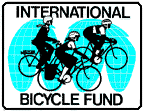Re-Thinking Roads &
High Occupancy Vehicle (HOV) Lanes

![]() IBF is 100%
IBF is 100%
solar powered
![]()
High Occupancy Vehicles Facilities (HOV) And The Public Interest
The conventional "wisdom" is that urban congestion can be alleviated by adding additional travel lanes. Of late this has been modified to specify High Occupancy Vehicle (HOV) lanes. But Chris Leman, Preston Schiller and Kristin Pauly even challenge the wisdom of these addition in "Rethinking HOV: High Occupancy Vehicle Facilities And The Public Interest". Any project which allows any increase in single occupancy vehicles is going to make matters worse for bicyclists and pedestrians. The report is built on 16 specific recommendations that directly address the short-comings, loopholes, hypocrisies and frauds of current HOV programs, while emphasizing the environmental and capacity benefits that could come from properly designed programs. Available from: The Chesapeake Bay Foundation, 162 Prince George St., Annapolis, MD 21401.
Voters Lead Politicians
Swiss voters passed an initiative to halt all new construction of major roads if they are intended to increase capacity.
IBF Math Department
You are mayor of a small town with a population of 155,000. You must determine the direction of the transportation program for the next 7 years. Which scenario would you choose?
Scenario A:
- Build five miles of belt-line highway at $7.5 million per mile.
- Build four miles of parkway at $10 million per mile. And,
- Double the capacity of a one mile corridor and bridge into the congested central business district at $79.5 million.
Scenario B:
- Give every resident over the age of 11 and capable of riding a bicycle (60% of the population), a free commuting bicycle package, complete with baskets, fenders, a lock, lights, rain- gear and a helmet. Bulk purchased $350 bikes are $250 and the accessories are $200.
- Install 10,000 seven-bike bicycle racks around the city at $350 per rack including installation.
- Install 10,000 two-bike bicycle lockers for use free of charge around the city at $700 each, including installation.
- Give away 10,000 car racks for carrying bicycles of people who carpool, $50 each on a bulk purchase.
- Give away 10,000 $200 bike trailers for carrying kids/cargo.
- Complete 30 miles of off-street non-motorized paths on the city's Bicycle Master Plan, at $150,000 per mile.
- Increase the $20,000 annual budget for the ride-share program by ten times and expand it to "Earth-share" program (see IBF News 1992 no.1).
- Completely eliminate the bus fare for all existing regional transit routes. (Fare box revenue is $2.25 million per year.)
- Provide free bus service to the airport every half hour from 5 a.m. to 11 p.m., 7 days a week. (The marginal cost per bus is $32.60 per hour, including capital depreciation, maintenance and labor, and two buses would be needed.)
- Hire 10 employees at an average of $40,000 per year, plus $25,000 per year in benefits, plus $35,000 per year in support services and supplies to administer the new transportation programs.
- Eliminate the projected city budget shortfall from 1994 until the year 2000. ($8 million for FY '94 and $10 for each remaining year.)
- Give $100 a month to 1000 homeless people for the period.
- Use $4.1 million to build a library or lower taxes.
Based on Eugene, data supplied by the Center for Appropriate Transport, PO Box 1005, Eugene, OR 97440 USA
IBF's Bicycle / Development / Sustainability Bibliography / Reading List
Home | About Us | Contact Us | Contributions | Economics | Education | Encouragement | Engineering | Environment | Bibliography | Essay Contest | Ibike Tours | Library | Site Map | Search
![]()
The International Bicycle Fund is an independent, non-profit organization. Its primary purpose is to promote bicycle transportation. Most IBF projects and activities fall into one of four categories: planning and engineering, safety education, economic development assistance and promoting international understanding. IBF's objective is to create a sustainable, people-friendly environment by creating opportunities of the highest practicable quality for bicycle transportation. IBF is funded by private donation. Contributions are always welcome and are U.S. tax-deductible to the extent allowed by law.
![]()
![]() Please write if you have questions, comment, criticism, praise or
additional information for us, to report bad links, or if you would like to be
added to IBF's mailing list. (Also let us know how you found this site.)
Please write if you have questions, comment, criticism, praise or
additional information for us, to report bad links, or if you would like to be
added to IBF's mailing list. (Also let us know how you found this site.)
